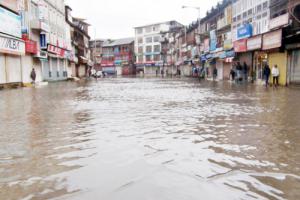Angelina Jolie visits Pakistan as it struggles to contain disease outbreaks after devastating floods 
Angelina Jolie, the Hollywood actor and special envoy of the UN Refugee Agency, has toured the worst-affected areas in Pakistan as the country grapples to contain the outbreak of diseases among hundreds of thousands of flood survivors .
The death toll in the flood-devastated country has reportedly soared to 1,569, according to the National Disasters Management Authority, amid fears many more will die as vast areas of the country remain submerged.
Jolie visited people displaced by the floods with international aid organisation International Rescue Committee [IRC] earlier this week in an effort to raise awareness.
"I've seen those lives who were saved," she said, while adding that without sufficient aid, others "won't be here in the next few weeks, they won't make it".
Her comments, made when visiting the country's flood response centre, were carried on video footage shared by the country's military on Wednesday.
Authorities and aid workers have said more immediate help is needed for displaced families exposed to swarms of mosquitoes and other hazards, such as snake and dog bites.
Sixteen million children affected
Local aid worker in Sindh, Obaid Ullah told the ABC via phone the rains have subsided now but the stranded water was of particular concern, especially for children and pregnant women.
"We are trying our best with all available resources to provide the basics such as food and drinking water, but the measures beyond that such as medicine and hygiene provisions are difficult to manage."
The UN Children Agency, UNICEF, has estimated the number of affected children to be around 16 million.
It said in a statement that children were already suffering from high rates of malnutrition, and poor access to water and sanitation even before the floods.
"Outbreaks of watery diarrhoea, typhoid and malaria are increasing as millions of people sleep in temporary shelters or in the open near stagnating water," it said.
Despite the efforts of the government and local and foreign relief organisations, many people are in dire need of food, shelter, medical assistance and medicines.
With Pakistan's already weak health system and lack of support, displaced families have complained of being forced to drink and cook with unsafe water.
"We know it can sicken us, but what to do? We have to drink it to stay alive," flood victim Ghulam Rasool told local Geo News TV as he stood near where his home was washed away in southern Pakistan.
A historic and intense monsoon, which dumped about three times as much rain as Pakistan's three-decade average, combined with glacial melt to cause unprecedented flooding.
The deluge, which scientists say was exacerbated by climate change, has affected nearly 33 million people in the South Asian nation of 220 million.
It has swept away homes, crops, bridges, roads and livestock in damages estimated at $US30 billion ($45.5 billion).